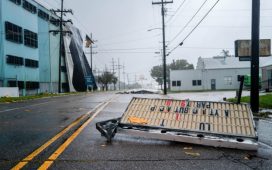Unlock the Editor’s Digest for free
Roula Khalaf, Editor of the FT, selects her favourite stories in this weekly newsletter.
The head of Tokio Marine has said the Japanese insurance company “cannot run away from” natural catastrophe risk despite deepening concerns among investors and policymakers over rising industry losses linked to climate change.
After successive years in which global claims from disasters such as hurricanes and wildfires topped $100bn, some big insurers have pulled out of climate-exposed areas while reinsurers have driven up their prices, feeding worries that climate change is making parts of the world uninsurable.
Tokio Marine chief executive Satoru Komiya said that while he understood concerns voiced to him recently by one investor over the insurer’s exposure to such calamities, “we cannot escape from natural catastrophe risk and therefore we need to have various means to protect ourselves”, and to face the risk “from the front”.
The use of reinsurance, which has also surged in price, was an important layer of protection, he told the Financial Times.
The group this month trimmed its full-year adjusted profit guidance because of increased claims from natural catastrophes such as Hawaii’s wildfires in August. But improvements elsewhere and an enhanced share buyback programme helped its shares to an all-time high.
Natural catastrophes, rather than a systemic cyber attack, remained the “biggest risk” to the sector, Komiya added. But he said the insurer needed to “be there” for its customers, stressing its responsibility to act as a shock absorber for society.
Warnings are growing from policymakers about an approaching “tipping point” when extreme weather caused by climate change makes insurance unavailable in certain regions. The Bank for International Settlements warned last week of the risks that an “insurance market failure for climate-related risks” could spill over into a credit shock and force government to be insurers of last resort.
In light of rising global risks, Tokio Marine “can no longer stay indifferent to what is happening around the world”, said Komiya.
Established in 1879, the company employs more than 43,000 people selling general and life insurance products and boasts a near-$50bn equity market value. After acquisitions such as London-based Kiln in 2008, it makes more than half of its profit overseas.
Komiya defended the rising cost of natural catastrophe cover, saying insurers had to “price the product appropriately”, adding: “For an insurance company, no matter what happens we must not see [the] backbone of the business being shaken.”
But he stressed the need to invest in resilience, working with clients to protect themselves better against events such as wildfires. It launched a new subsidiary in November to provide prevention and mitigation services.
While the company continues with its bolt-on acquisition strategy, Komiya said valuations in the industry were still too high for a sizeable acquisition: “We hardly come across a company that is affordable and still a high-quality company.”
One of Tokio Marine’s acquisitions, highlighted in a recent investor deck, was its April 2019 deal to buy the Bond & Credit Co, which provided $10bn of credit cover to Greensill Capital. After Greensill’s insurers decided not to extend its cover, the business collapsed, sparking a financial and political scandal.
Tokio Marine has previously said it started to develop “particular concerns” about Greensill by July 2020, the month it dismissed an insurance executive for allegedly exceeding his underwriting limits in relation to the group.
Asked whether the degree of insurance exposure to Greensill should have been discovered before the acquisition, Komiya said: “In hindsight, we do still believe that we went through the appropriate due diligence process.” The company has also “raised awareness among our employees in order to prevent such a case [from reoccurring],” he added.
Tokio Marine is being sued by investors seeking payouts on the credit insurance, but expects no material financial impact. The insurer is arguing in Australian proceedings that the credit insurance was invalid because of misrepresentations from Greensill. The assumption built into credit insurance, Komiya said, was “that people are trading and doing business with honesty and goodwill”.








